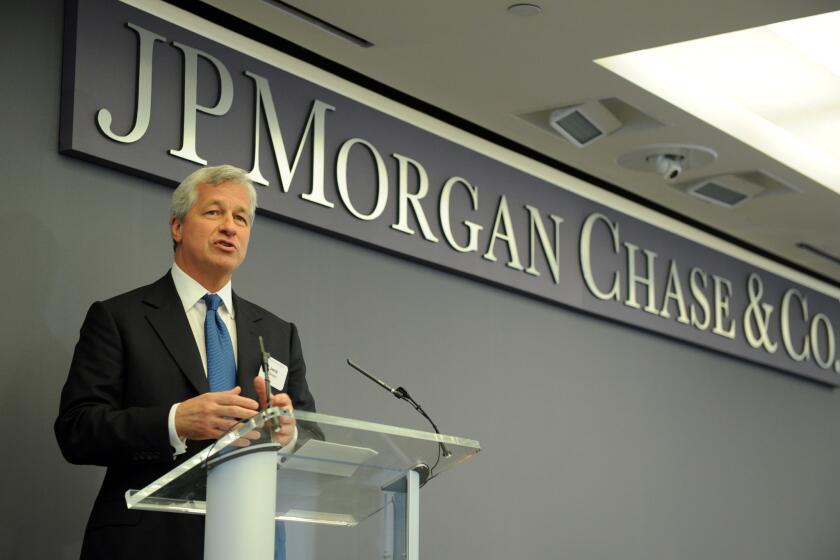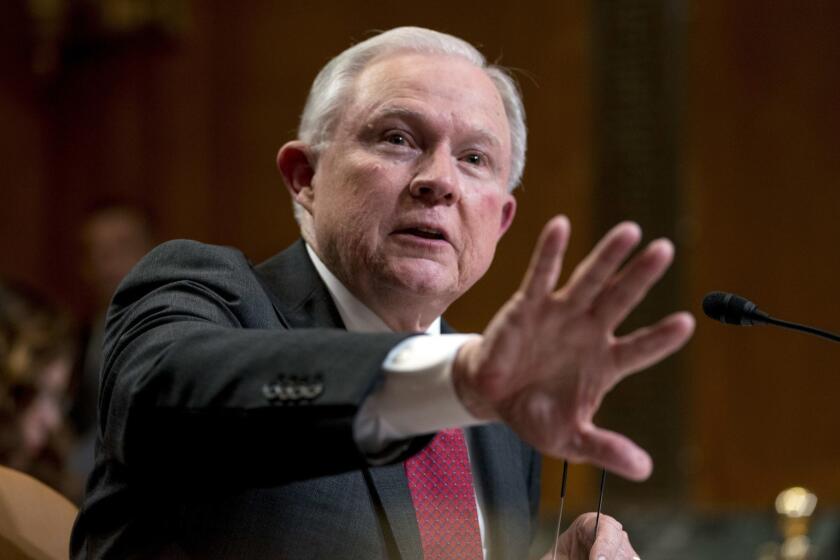Lawbreaking corporations have wriggled off the hook for years. Biden can fix that

- Share via
We know what to do with individual criminals who repeatedly break the law: We throw the book at them. Three-strikes laws in effect in California and at least 27 other states subject repeat offenders to enhanced sentences up to life in prison.
Corporations, not so much. The roll of American businesses brims with major corporations that have been found to have violated federal and state laws over and over again, sometimes more than 100 times.
Often they settle federal charges by paying a few million dollars in fines and penalties and promising not to repeat the crimes (sometimes without admitting or denying them) in return for a deferred- or non-prosecution agreement, providing they keep their noses clean.
We have no tolerance for companies that...continue to commit crimes.
— Deputy Attorney General Lisa O. Monaco
Then they break the law again. Allegedly.
The best example of how to ride this merry-go-round comes from JPMorgan Chase. As I reported last year, JPM paid the government a record $920 million in penalties for an eight-year-long plot to rig financial markets.
Get the latest from Michael Hiltzik
Commentary on economics and more from a Pulitzer Prize winner.
You may occasionally receive promotional content from the Los Angeles Times.
Dan M. Berkovitz, a member of the Commodity Futures Trading Commission, called “the scope of misconduct and market harm ... unparalleled.”
The Justice Department cut the deal as a “deferred prosecution agreement,” through which it pledged not to pursue harsher penalties if the bank stayed out of trouble for three years.
The problem here is that JPMorgan was already under a three-year sentence of probation imposed in May 2015 for manipulating the foreign exchange market, for which the bank pleaded guilty to a single conspiracy count.
In that deal, the bank was forbidden to “commit another crime in violation of the federal laws of the United States.”
According to the prosecutors, however, the bank continued to break the law while the earlier settlement was being negotiated and continued for seven months after the bank promised not to break the law again.
“The prosecution of corporate crime has been a joke up until now,” says Dennis Kelleher, head of the Wall Street watchdog Better Markets.
Biden searches for an antitrust enforcer who could radically transform the U.S.
That may be about to change. On Oct. 28, Deputy Atty. Gen. Lisa O. Monaco delivered a stern warning to an audience of corporate defense attorneys. “We will not hesitate to hold companies accountable” for breaking the law, she said. That means prosecuting “the individuals who commit and profit from corporate malfeasance,” as well as their employers.
Monaco took particular aim at deferred- and non-prosecution agreements “DPAs and NPAs are not a free pass,” she said, “and there will be serious consequences for violating their terms.” She mentioned that two multinational corporations had recently received a notice from the Justice Department that they were under investigation for breaching the terms of previous agreements.
Monaco didn’t identify the companies, but she was referring to the Swedish telecommunications company Ericsson and the Scotland-based bank NatWest.
Ericsson said on Oct. 21 that it had received a notice that it had breached a 2019 agreement under which it admitted to having paid bribes and paid a penalty of $1 billion. Ericsson says the Justice Department attributed the breach to its failure to provide required documents and factual information.
NatWest disclosed on Sept. 3 that the Justice Department was accusing it of breaching a 2017 deal over “spoofing” — submitting fraudulent trades in the markets for mortgage-backed securities and other investments. The company has disclosed that it found further suspect trades allegedly done in 2018.
Indulgent treatment of corporate crime dates back decades and crosses party lines. During the Obama administration, Justice Department bosses let it be known that they didn’t want local prosecutors to bring cases against corporate executives unless they could guarantee a win, Kelleher recalls.
Hiltzik: JPMorgan gets yet another ‘sweetheart’ deal from feds for flagrant market corruption
JPMorgan got caught manipulating markets for the third time, but gets a sweetheart settlement from the feds
That was the kiss of death for most such cases, since up-and-coming Justice Department lawyers knew that complicated cases against big, rich companies would never offer a slam-dunk outcome. No one would risk his or her career on a roll of courtroom dice.
Under Donald Trump, tolerance of corporate malfeasance was baked into the department’s bones and prosecutions plummeted. In 2020, only 94 prosecutions were brought, the lowest number in at least a quarter-century and a two-thirds decline from the high water mark of 296 reached in 2000.
Meanwhile, leniency agreements — DPAs and NPAs — became the resolution of choice. In 2020 those agreements accounted for 32% of all corporate case outcomes, the highest share since 1996.
“Declining prosecutions and increasing leniency agreements are not signs that corporate America has become better at obeying the law,” the advocacy group Public Citizen observed in May.
“On the contrary,” Public Citizen reported, “they are signs that, despite Trump’s ‘law and order’ rhetoric and his administration’s brutal crackdowns on immigrants, racial justice protestors and low-level offenders, the administration went out of its way to avoid prosecuting corporate criminals.”
Major corporations that were permitted to skate on criminal allegations in 2020 included JPMorgan, which last year collected its fourth leniency agreement in a decade.
Chipotle Mexican Grill admitted to violations of food safety laws that sickened more than 1,100 diners from 2015 to 2018 and paid a record food-safety criminal fine of $25 million to secure a three-year DPA. Current and former units of the Swiss drug company Novartis received multiple DPAs to settle charges they violated federal anti-bribery laws.
Wrist-slap treatment of corporate wrongdoers doesn’t always stem from orders on high. To some extent it’s an artifact of the law business, in which white-collar defense attorneys move back and forth between law firms and the Justice Department, infecting the prosecutorial corps with the defense bar’s RNA.
Monaco’s appointment in April was a departure from that pattern. Although she came to the department from the white-shoe law firm O’Melveny & Myers, there she had specialized in data security and privacy law.
During the Obama years, Monaco served in the White House as an advisor on homeland security and counterterrorism. And during a previous stint at the Department of Justice from 2001 to 2007, she served on the agency’s Enron Task Force, co-leading the prosecution of five former Enron executives.
In what may be the Trump administration’s most dishonest and cowardly attack yet on the Affordable Care Act, the Department of Justice late Thursday asserted that key provisions of the law are unconstitutional and refused to defend it against a legal challenge brought by 20 red states.
In her Oct. 28 speech to the American Bar Assn.’s National Institute on White Collar Crime, Monaco pinpointed several principles that enfeebled the department’s approach to corporate crime.
She rescinded the demand that only winning cases be brought: “The government may lose some of those cases,” she acknowledged. But “as long as we act consistent with the Principles of Federal Prosecution, the fear of losing should not deter them.... We will urge prosecutors to be bold in holding accountable those who commit criminal conduct.”
Monaco dictated that corporations seeking credit for cooperating with the government in criminal cases would have to “identify all individuals involved in the misconduct, regardless of their position, status or seniority.”
That reverses prior agency guidance that required companies to identify only those they judged to be “substantially involved” in the wrongdoing — a rule that amounted to an escape clause for chief executives and other top executives who oversaw, even if indirectly, the wrongdoing. Better for the department to decide the culpability of individuals, rather than allowing corporations to protect their top dogs.
She also broadened the range of prior misconduct that would be considered in judging whether to go easy on a corporation.
Under prior practice, only previous misconduct similar to the new charges would be considered — only prior bribery accusations in a bribery case, or tax violations in a tax case, for instance. Now prosecutors will be instructed to consider the full record of criminal, civil and regulatory actions, including federal, state and foreign cases.
“Prosecutors need to start by assuming all prior misconduct is potentially relevant,” Monaco said.
Warren Buffett, Jeff Bezos, and Jamie Dimon thought they could solve healthcare. They never had a chance.
As for leniency agreements, Monaco said she was disturbed to learn from Department of Justice records that “somewhere between 10% and 20% of all significant corporate criminal resolutions involve companies who have previously entered into a resolution with the department.”
“I want to be very clear,” she said. “We have no tolerance for companies that take advantage of pretrial diversion by going on to continue to commit crimes, particularly if they then compound their wrongdoing by knowingly hiding it from the government. It is hard for me to think of more outrageous behavior by a company that has entered into a DPA or NPA in the first place.”
Finally, Monaco committed to providing white-collar prosecutors with a “surge” in resources. Among other steps, the agency will embed a new squad of FBI agents in the Justice Department’s criminal fraud section.
In principle, Monaco’s approach would have produced a different outcome in last year’s JPMorgan Chase affair. Its 2015 probation agreement would have been ripped up and the prosecution reinstated. The bank might well have been declared ineligible for another deferred prosecution deal. Waivers that allowed the bank to keep its privileged status in the securities markets despite the criminal charges — waivers that drew an impassioned objection from Kara M. Stein, then a member of the Securities and Exchange Commission — might have been revoked.
In sum, JPMorgan Chase would have faced real consequences for a crime to which it had pleaded guilty in 2015 (and paid a $550-million fine). The firm would have had to defend itself in a new criminal proceeding, rather than paying a fee, no matter how steep, to make it go away. The financial markets might have been rendered at least a tad more honest.
Under the new approach, what will happen next? Kelleher, who declared Monaco’s speech a “home run,” knows that only time will tell.
“Are they really going to be fearless against wealthy, politically connected firms like JPMorgan?” he asks. “It’s easy to be tough on the minnows. The jury is out until DOJ takes meaningful actions against top-tier corporations and their executives.”
More to Read
Get the latest from Michael Hiltzik
Commentary on economics and more from a Pulitzer Prize winner.
You may occasionally receive promotional content from the Los Angeles Times.














